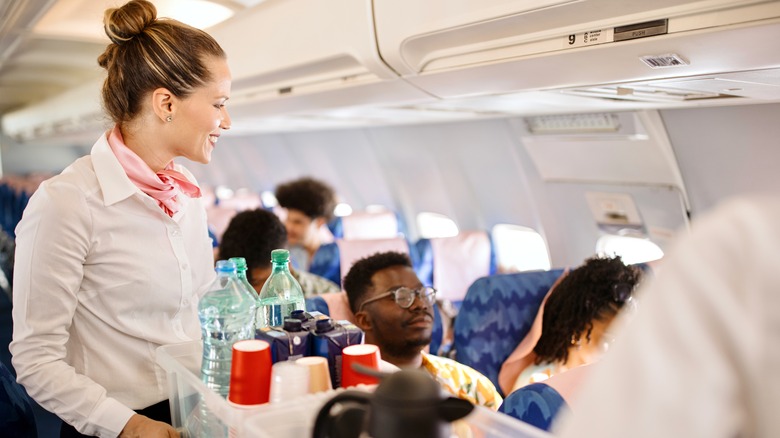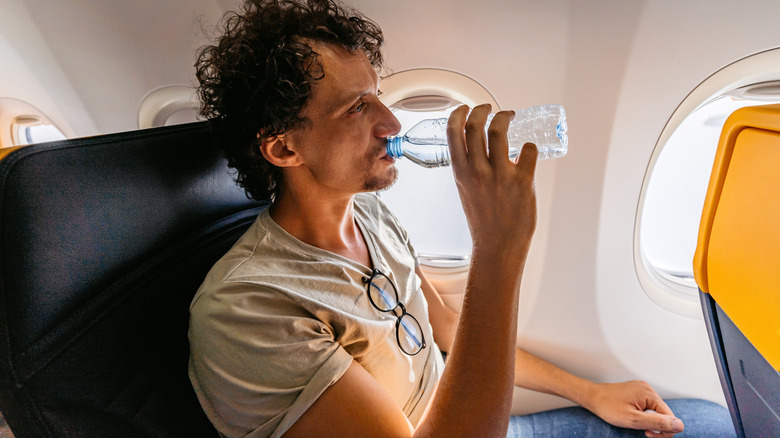The Unexpected Reason Many Frequent Travelers Won't Eat Any Food On A Plane
Plane food often gets a bad rep. Cold, bland, and unappetizing — it's hard to find someone who actually enjoys plane food, let alone looks forward to eating it. And when people like Anthony Bourdain have famously criticized eating airplane food, it gives you all the more reason to avoid it, right?
However, beyond taste and quality, there's even more reason to avoid eating food on the plane and waiting until you've landed, either at your destination or between flights. The reason? Beating jet lag. Yeah, you heard that right.
The process known as the "Argonne anti-jet-lag-diet" involves fasting and eating at specific times to help your body's biological clock adjust to your new time zone. Preferred by members of the U.S. Army, Navy, CIA Agents, and even presidents, the "anti-jet lag diet" isn't that hard to follow — and it'll leave you feeling refreshed and alert when you arrive at your destination. While there are two versions of the diet, the most commonly preferred by your average traveler is an updated, less extreme version designed by Dr. Clifford B. Saper, which doesn't require a 4-day alternating fast like the one used by special agents. Sure, you want to be awake when you kick off your holiday, but there's no need to be on CIA-spy levels of alert for your sightseeing tour.
How it works
To start, you'll want to find a time zone converter to make things way easier for you. Dateful, for example, is a great option that lets you see two destinations side-by-side. Then, add your current time zone and the time zone for your destination. Once you have both of these handy, it's time to start calculating the time for your last meal. Ideally, you'll want to start fasting anywhere from 12 to 16 hours before your destination's breakfast time.
For instance, if you're traveling from New York to Paris, and you're set to arrive in Paris at 10 a.m. local time, which means it'll be 4 a.m. in New York, you'll want to start fasting around 12 p.m. or 4 p.m. New York time on the previous day. During the fast, you'll also want to be sure you only drink water. In other words, no juice, soda, or alcoholic beverages, and stay away from even the tiniest snack.
Once you land in Paris and it's breakfast time, break your fast with a high-protein meal that'll help re-sync your body's internal clock with the new time zone. From there, go about your day and keep yourself active (which means no napping), eat lunch and dinner at your "normal" destination times, and steer clear from any caffeine that might mess with your sleep cycle. Lastly, finish off the day with a carb-heavy dinner that'll help promote natural sleep and ease your transition into the new time zone.
Other tips to beat jet lag
Along with fasting, there are plenty of other strategies to make your transition to a new time zone a lot more comfortable. For starters, there's staying hydrated and keeping your body balanced. According to the Center for Family Medicine, airplane cabins are known for their low humidity levels, which can lead to dehydration and feelings of fatigue and grogginess. That said, drinking plenty of water before, during, and after your flight will keep you feeling fresh even after a 10-hour flight.
Then, there's the importance of choosing the right foods. Per WebMD's suggestion, eating foods rich in tryptophan — think turkey, certain fish, grains, and nuts — can promote sleep through an increase in serotonin production, which is directly linked to better sleep quality. In line with this, you'll also want to avoid heavy, fatty foods that can lead to painful indigestion and ultimately make it harder for you to fall asleep comfortably.
Lastly, and this might sound like a buzzkill for travelers who love a quick stop by the airport bar, excessive alcohol, and caffeine intake can also put a stop to your dreams of restful sleep. While caffeinated drinks might help you stay awake during the day, it's best to drink these in moderation and before 3 p.m. As for booze, try to stay away from the bottle for at least a few days or until your body has truly adapted to your destination's local time zone.


